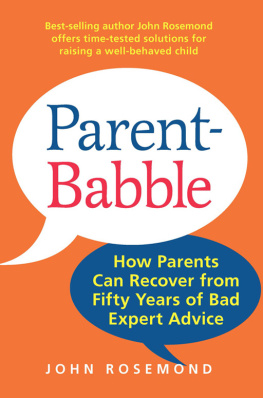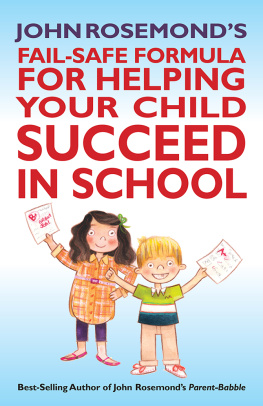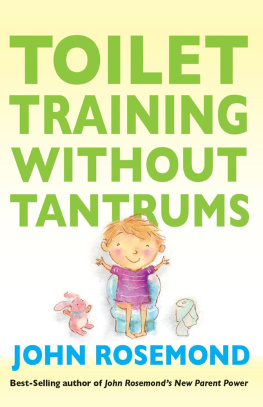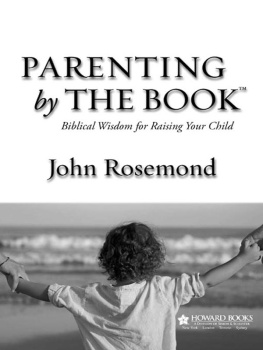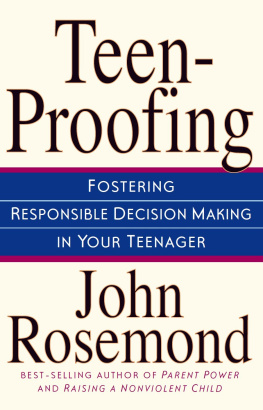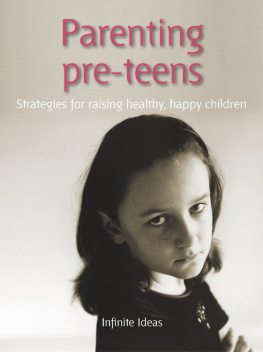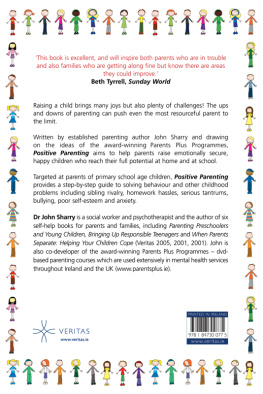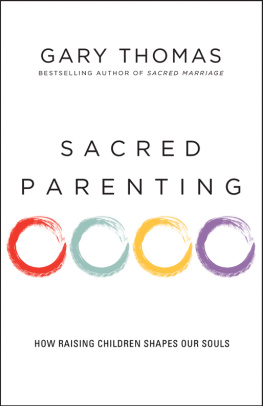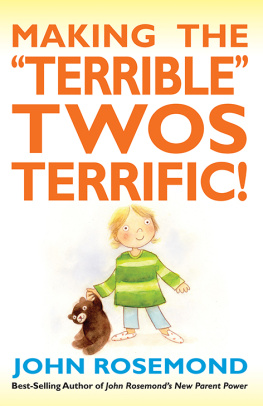

Other Books by John Rosemond
Teen-Proofing
Raising a Nonviolent Child
Because I Said So!
John Rosemonds Six-Point Plan for Raising Happy, Healthy Children
Parent Power! A Common-Sense Approach to Parenting in the 90s and Beyond
Ending the Homework Hassle
Making the Terrible Twos Terrific!
To Spank or Not to Spank...
A Family of Value
John Rosemonds New Parent Power!
Family Building

To Willie
Contents
Acknowledgments
T hanks to everyone at Andrews McMeel, and especially my editor, Christine Schillig, for all of their invaluable help and support over the years.
Thanks to my family, friends, and fans for their faith in me and for all the great material.
Thank you, Father, for everything, from the beginning, and especially for the gift of your Son. I only wish Id known then what I know now.
Introduction
T hese days it seems that the more things change in parenting, the more they keep right on changing. Todays parents are trying to have wonderful relationships with their children. Our foremothers and forefathers did not, realizing that a child required leadership first, and that while the parent/child relationship should by no means be bad, a parent could not provide proper leadership if the parents energies were focused primarily on having a wonderful relationship with the child. Some things just had to wait.
Todays moms orbit around their children, dedicated to making them happy. Yesterdays moms were at the center of their childrens attention, dedicated to teaching them to stand on their own two feet. Todays moms are trying to do as much for their children as they possibly can. Yesterdays moms were consciously trying to do as little for their children as possible, in addition to insisting that their children both do for themselves and do for the family (in the form of chores). Todays moms function as servants to their children for the term of their dependency, which is lengthening. Yesterdays moms functioned as authority figures, as dispensers of responsibility. Todays moms work for their children in perpetuity, believing that the best mom is the mom who serves best. Yesterdays moms had their children working for them by the time the youngsters were three, believing that the best mom was the mom who prepared her child for a life of his own.
Which brings us to todays dads. The new ideal in American fatherhood is that of being the childs best buddy. Yesterdays dad was an authority figure, a mentor. He taught his child magic tricks, how to ride a bike, use a hammer, train a dog, and the like. He and his child had fun together, but he was not his childs friend. He knew that parenting came before friendship, and that when the time cameafter the childs emancipationhe could not be a good friend if parenting issues were still begging for resolution.
Yesterdays parents were married to one another. They knew, intuitively, that their relationship had to be stronger than either of their relationships with their children. In todays all-too-typical family, the parent-child relationship is stronger than the husband-wife relationship, which is a clue as to why so many marriages dissolve after the emancipation of the last child.
Yesterdays parents were attuned to the voice of common sense, which was why they did not complain that raising children was the hardest thing theyd ever done. For todays parents, the voice of common sense has been drowned out by a confusion of psycho-babble, which is a primary reason why so many parents tell me that raising even one child leaves them emotionally and physically exhausted at the end of many a day.
Yesterdays parents took child rearing, but not their children, seriously. Todays parents are prone to taking both child rearing and their children much too seriously. The former attitude is essential to the healthy parent-child relationship; the latter is a form of self-oppression that drains all humor from the enterprise of child rearing and turns it into drudgery.
Why are todays parents having so many more behavior and school-performance problems with their children than did parents just two generations ago? Its simple, really: You cannot approach child rearing in two entirely different ways and arrive at the same outcome.
You will not encounter psychobabble in this book. It is not a book about the supposed psychology of the child. The term self-esteem is mentioned but once, in the third paragraph of chapter 1, and the reference is in passing. It is a book about how to strengthen a child for the world, which is where a child will need strength. That job requires that a parent be strong, as strong as the child will eventually need to be.
A father once told me he didnt discipline his child in certain ways and in certain situations because he didnt like to. I told him that being a good parent required that one sometimes do exactly what one doesnt like doing. Good parenting isnt about what a parent likes or doesnt like. Its about what a child needs, whether the parent likes it or not.
Ive written this book to help parents get their feet on solid ground, their priorities in order, and their heads out of the clouds of babble. Its my aim to help restore common sense and a sense of humor to what is at one and the same time the biggest and most rewarding of all responsibilities.
Be forewarned: Im trying to turn the clock back. As Paul McCartney put it, I believe in yesterday. I am absolutely, without a shred of doubt, convinced that parenting was stronger fifty years ago than it is today, and that children were stronger as a result. I am also absolutely, without a shred of doubt, convinced that it is possible for todays parents to raise todays children in like manner.
Whenever I say this, it is inevitable that someone will protest, But times have changed! Yes, they have, but those changes do not require that the fundamental principles of parenting change. After all, todays world is a far, far different place from the world of 1787, the year the Constitution of the United States was finalized. But the Constitutions principles are as relevant today as they were two hundred years ago. Similarly, the parenting principles that guided yesterdays parents are as relevant today as they were then.
The problem is that many of todays parents have embraced new principles. These new principles have been pushed on our culture by psychologists and other experts for two generations now, time enough to see that they dont work. Fifty years ago, when traditional, time-honored parenting principles prevailed, children did their own homework. Today, Mom sits with her child while he does his homework, and she ends up doing much of it for him. Fifty years ago, a child talked back occasionally. Todays child is likely to talk back several times a day. Fifty years ago, children were mischievousthey tried to get away with misbehaving when adults werent looking. Todays children misbehave whether or not adults are looking.
Believe it or not, it is still possible to raise a child who does his own homework, talks back only occasionally, and is nothing more than mischievous.
I wrote this book to help make that possibility a realityfor you.
POINT ONE
The Parent-Centered Family
B ecause Im regarded as an expert on such matters, parents are forever asking me questions about raising children. These questions run the gamut, but most parents really seem to be searching for the supposed secret to raising a happy, successful child.
Next page

